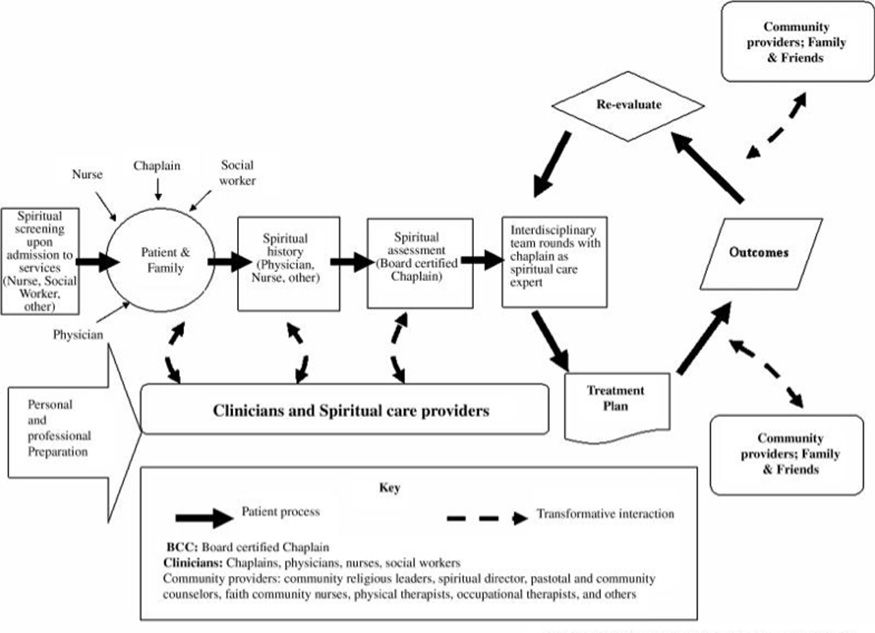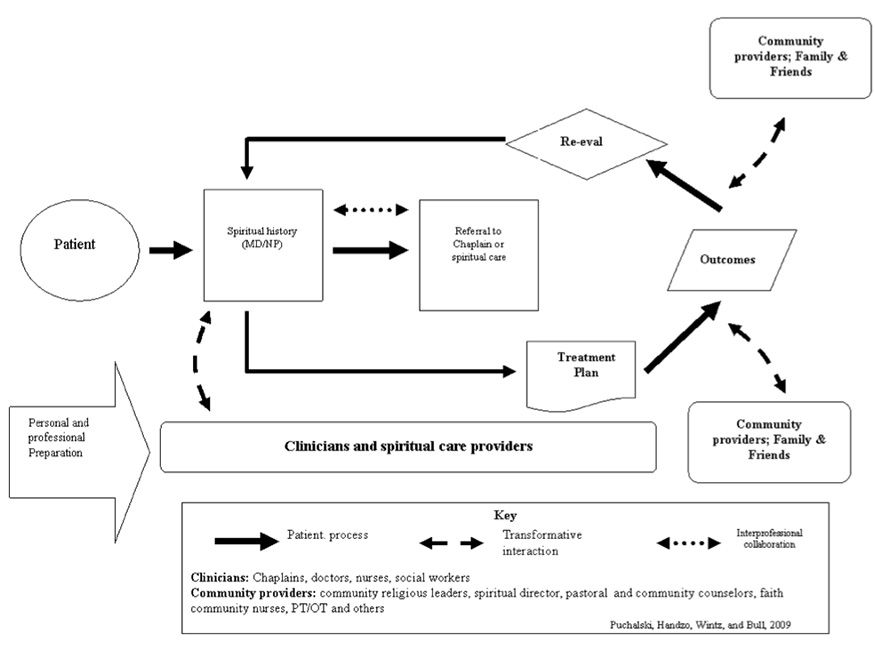
New York-based Grant Opportunity
Applications due August 1, 2023
As part of our Advancing Spiritual Care in Everyday Clinical Practice initiative, we are inviting clinician/chaplain pairs to develop and conduct demonstration projects consisting of interprofessional spiritual care clinical models that can be tested in multiple health settings. Findings will then create pathways for future research, grants, and a larger, more standardized implementation of interprofessional spiritual care.
Become a GWish Scholar

As a clinician or chaplain in a New York-based health setting, you have a unique opportunity to join a select group of colleagues as leaders in the field of spirituality and health.
With gratitude for the generosity of the Y.C. Ho/Helen and Michael Chiang Foundation, we are pleased to announce that clinician/chaplain pairs from New York are invited to apply for a grant to conduct a demonstration project consisting of spiritual assessment models that can be tested in multiple health settings.
As emerging leaders in this nascent field, you will join a network of GWish Scholars, working with mentors, teachers, and fellow scholars to elevate spiritual health as a new standard across all health systems.
If you or your organization wish to participate in this early-stage development of the field of spiritual health, we encourage you to apply. All teams must consist of one clinician and one chaplain from the same New York-based health setting.
The Demonstration Project Team will receive $100,000 in funding for their two-year project, thanks to the Y.C. Ho/Helen and Michael Chiang Foundation.
Application now closed
Frequently Asked Questions (FAQs)
- What are the demonstration projects about?
-
The Advancing Spiritual Care initiative is requesting proposals for Demonstration Projects in the field of interprofessional spiritual care. These projects will be based on the Generalist Specialist model of professional spiritual care, in which clinicians (generalists) collaborate with spiritual care specialists, such as board-certified chaplains. In this first cycle of this initiative, we are focusing on clinician-chaplain pairs that care for patients with serious and/or chronic illness. The goal of the current initiative is to support Demonstration Projects in spiritual assessment to include projects related to spiritual screening and history as completed by clinicians, and/or more comprehensive spiritual assessment as completed by chaplains. The Advancing Spiritual Care initiative is funded by The John Templeton Foundation; the project is led by Dr. Christina Puchalski of The George Washington University’s Institute for Spirituality and Health (GWish) in collaboration with Dr. Betty Ferrell at City of Hope Medical Center and Dr. Trace Haythorn at the Association for Clinical Pastoral Education (ACPE). Funding for this New York-based Demonstration Project is provided by The Y.C. Ho/Helen & Michael Chiang Foundation.
The Generalist-Specialist model is fundamental to the practice of interprofessional spiritual care at GWish, and in the current Advancing Spiritual Care project. This model is the foundation of Demonstration Project design, and all proposed projects will be evaluated based on effective implementation strategies for Generalist-Specialist spiritual care in the focus areas of spiritual screening, history, and assessment as shown in the diagram below.
Figure 1. Inpatient Spiritual Care Implementation Model

1Puchalski C, Ferrell B, Virani R, et al. Improving the quality of spiritual care as a dimension of palliative care: the report of the Consensus Conference. J Palliat Med. 2009;12(10):885-904.
Figure 2. Outpatient Spiritual Care Implementation Model

2Puchalski C, Ferrell B, Virani R, et al. Improving the quality of spiritual care as a dimension of palliative care: the report of the Consensus Conference. J Palliat Med. 2009;12(10):885-904. The Advancing Spiritual Care initiative is intended to develop clinical models of interprofessional spiritual care through Demonstration Projects that can be tested in future research and practice to establish an evidence-base for spiritual care in clinical settings and to create a Learning Collaborative from these models to share best practices and create a network of spiritual care leaders.
Application now closed
- How will the demonstration projects be structured and who should apply?
-
We will select one New York-based project team composed of a dyad of one clinician and one chaplain (from the same New York-based health setting) who focus on care for seriously and chronically ill patients, and who work in a clinical setting such as a hospital, clinic, university, or other health organization. The selected team will be one of multiple Advancing Spiritual Care teams who will develop and implement Demonstration Projects in spiritual assessment that represent a successful model of collaboration between clinicians and chaplains to build the knowledge and evidence for interprofessional spiritual care.
While the primary goal is to support implementation of the Demonstration Projects, we also recognize the opportunity to develop leaders in spiritual care, and thus will incorporate a Learning Collaborative and structured mentoring of all project teams. From the project evaluation we hope to learn 1) the facilitating factors and barriers to effective implementation of existing guidelines and recommendations, and 2) the potential impacts of successful implementation of improved spiritual care on key stakeholders. This Learning Collaborative and evaluation process will inform future cycles of this initiative to create sustainable outcomes for establishing the field of spiritual care.
The Demonstration Projects in this cycle will focus exclusively on the category of spiritual assessment which includes the areas of spiritual screening, history, and comprehensive chaplain assessment. The primary goal of these projects, including the New York-based project, is to focus on effective implementation of existing national guidelines for spiritual care.
The National Consensus Project Clinical Practice Guidelines for Quality Palliative Care, and specifically the spiritual domain, serve as a key source to guide the projects (www.nationalcoalitionhpc.org). The projects will aid in identification of facilitating factors and barriers to successful implementation of currently established recommendations, paving the way for improved implementation outcomes for spiritual care models.
Application now closed
- What do I need to know about preparing my proposal (application)?
-
One New York-based clinician-chaplain team will develop and implement a Demonstration Project to be completed within two years. Each proposal should have a detailed and well-developed implementation plan and a precise evaluation plan. If the Demonstration Project team leaders do not have prior experience in research or QI projects and evaluation, they are encouraged to collaborate with a strong research mentor within their organization or obtain that expertise though the addition of a local or national research mentor, who will help ensure the project’s successful completion. Each proposal should provide a description of how the project will address issues of diversity and inclusion.
While Demonstration Projects teams will be required to secure IRB approval to be implemented in their home institutions, IRB approval is not required to be completed by the August 1st application deadline. We recognize that approval timeframes can vary by institution. The selected Demonstration Project team will be expected to complete the IRB approval process upon notification of their award.
The proposal evaluation criteria include: 1) applicants’ CV and clinical background; 2) the Demonstration Project team and local mentor's research or QI experience; 3) quality and feasibility of the proposed Demonstration Project; 4) commitment of the applicants' organization based on the letters of support; 5) the potential for clinical implementation and assessment of potential impact for key stakeholders [healthcare system, patients, and clinicians]; 6) the potential for models that can be tested in future research or practice; and 7) a sustainability plan for future years.
Application now closed
- What are the requirements / expectations if I’m selected to participate?
-
During the two-year project development, implementation, and evaluation at their home institution, the Demonstration Project team will be expected to:
- Participate in the initial virtual ISPEC course on October 26 & 27 and virtual Demonstration Project Launch meeting in Fall 2023
- Submit their project for approval by their institution's IRB
- Participate in all virtual monthly Learning Collaborative sessions and complete session evaluations
- Participate in all monthly mentoring calls
- Conduct ongoing project evaluation
- Submit (1) article for publication and (1) abstract for presentation based on the completed Demonstration Project
- Present Demonstration Projects at an ISPEC training
- Participate in the Final Demonstration Project Team Meeting
- Complete program evaluation at the initiation and completion of the two-year project
Application now closed
- Who is eligible to participate?
-
The current Demonstration Project grant opportunity is limited to applicants in clinical settings within the state of New York. The project should include one board-certified chaplain and one clinician from the same New York-based health setting as project leaders. We realize not all settings have board certified chaplains. We will consider applicants with commensurate professional chaplaincy experience to include 8 or more years of clinical chaplaincy or 4 units of CPE and 2000 hours of clinical practice.
Application now closed
- How much funding will be awarded to each project team?
-
One New York-based project will be funded through this current grant opportunity. The Demonstration Project will receive funding of $100,000 and the project duration is two years. Funds will be disbursed in (2) $50,000 payments, the first in Year 1 and the second in Year 2. In subsequent project cycles, we plan to include selection of international Demonstration Project teams.
Application now closed
- What costs are covered by the funding?
-
The funds from this award for a Demonstration Project can be used for salary support of the project leaders (including salary and fringe benefits) and project staff, and other direct costs associated with the project such as consultant costs, statistical support, or supplies. Travel and accommodations for the 2-day Final Demonstration Project Meeting to be held in Washington, D.C. should be included in your budget. Indirect costs are not allowable.
Application now closed
- How do I apply?
-
The Advancing Spiritual Care Demonstration Project Application and instructions can be accessed via the link on this webpage. All applications are due August 1, 2023. The recipient team will be notified by September 22, 2023. For questions regarding the Demonstration Projects or assistance in completing the application please contact Cherron Gardner-Thomas at gwish@gwu.edu.
Application now closed
- What rubric will be used to evaluate my application / proposal?
-
The following rubric will be used as a part of the evaluation process for DP applications/proposals. The rubric integrates evidence-based implementation science domains that are hallmarks/indicators of successful implementation outcomes.
Implementation Science Domains
Instructions:
Please evaluate how well the application as a whole integrated and addressed each of the following implementation domains. See the definition of each implementation domain below.Evaluation Rubric Scale
Scoring:
4=Excellent
3=Good
2=Limited, lacking details
1=Minimal
0=Not addressed at allAcceptability:
The perception of stakeholders that the demonstration project and the innovations, interventions, or practice changes to advance spiritual care are agreeable, palatable, high-quality, or satisfactory in the particular setting. It may entail stakeholders’ confidence in and satisfaction with project implementation and outcomes. Potential implementation stakeholders may include patients, clinicians/chaplains, administration, or health system.4- Proposal clearly describes the potential acceptability of the project and strategies to maximize acceptability among implementation stakeholders (e.g., patients, clinicians/chaplains, administration, or health system).
3- Proposal discusses the potential acceptability of the project
2- Proposal may mention the potential acceptability of the project but lacks details.
1- Proposal has a very vague or minimal description of the potential acceptability of the project.
0- Not addressed at allAdoption:
The intention, initial decision, or action to try/employ an innovation or practice change proposed in the project and the stakeholder engagement or lack of engagement with the project throughout implementation.4- Proposal clearly describes how the project will facilitate adoption and engagement and address barriers and lack of engagement throughout the implementation process.
3- Proposal discusses strategies to facilitate the adoption of the project in the particular setting.
2- Proposal may mention adoption but lacks details.
1- Proposal has a very vague or minimal description of the adoption of the project.
0- Not addressed at allAppropriateness:
Perceived fit, usefulness, suitability, or relevance of the proposed demonstration project with respect to the particular clinical setting and needs.4- Proposal provides a detailed description of the appropriateness of the project and why the project is a good fit for the particular setting.
3- Proposal discusses the appropriateness of the project and the fit for the particular setting.
2- Proposal may mention the appropriateness of the project but lacks details.
1- Proposal has a very vague or minimal description of the appropriateness of the project.
0- Not addressed at allFeasibility:
The extent to which the demonstration project can be successfully carried out with available resources in the particular setting (e.g., personnel, money, time, infrastructure, communications, etc.). The degree to which the project is implementable and suitable/practical to implement in the setting.4- Proposal clearly describes the feasibility of the project and how it will be carried out with available resources.
3- Proposal discusses the feasibility of the project in the particular setting.
2- Proposal may mention the feasibility of the project but lacks details.
1- Proposal has a very vague or minimal description of the feasibility of the project.
0- Not addressed at allFidelity:
The extent to which the demonstration project will ensure that it is delivered as intended by the project team. The degree to which it will maintain high quality and adherence to the proposed plans for the innovations or practice changes to advance interprofessional spiritual care.4- Proposal clearly describes how fidelity will be achieved and maintained with regards to the project and explains how the project ensures that interprofessional spiritual care practice will be advanced as intended.
3- Proposal discusses strategies to ensure the fidelity of the project in the particular setting.
2- Proposal may mention the fidelity but lacks details.
1- Proposal has a very vague or minimal description of fidelity.
0- Not addressed at all.Reach/Penetration:
The extent to which the project will reach the target audience/participants (e.g., patients, clinicians/chaplains, administration, or health system). The proportion of the target audience who are actually reached by the project in the particular setting. The degree to which the project outcomes/impact may potentially be adopted at the broader institution and beyond.4- Proposal clearly describes how the project will maximize its reach and penetration among target audience/participants and presents reasonable strategies to address barriers and opportunities.
3- Proposal discusses strategies to ensure the reach and penetration of the project in the particular setting.
2- Proposal may mention the reach and penetration of the project but lacks details.
1- Proposal has a very vague or minimal description of the reach and penetration of the project.
0- Not addressed at all.Sustainability:
The extent to which the proposed demonstration project and the implemented interprofessional spiritual care practices continue after external grant support is terminated. The extent to which the new practices are continued, incorporated, integrated, or standardized in your setting resulting from the project.4- Proposal clearly describes the sustainability of the project and the potential for the implemented practices to be integrated and continue after grant support.
3- Proposal discusses strategies to ensure the sustainability of the project in the particular setting.
2- Proposal may mention the sustainability of the project but lacks details.
1- Proposal has a very vague or minimal description of the sustainability of the project.
0- Not addressed at allOrganizational Climate and Culture:
The degree to which the organizational climate and culture is conducive and supportive for the implementation of the demonstration project.4- Proposal clearly describes how the organizational climate and culture is conducive and supportive for project implementation.
3- Proposal discusses the potential organizational support for the project in the particular setting.
2- Proposal may mention the organizational climate and support but lacks details.
1- Proposal has a very vague or minimal description of the organizational climate and support for the project.
0- Not addressed at allLeadership:
The leadership capability, experience, and potential of applicants for implementing the proposed demonstration project in their setting as reflected by the application as a whole.4- The application as a whole reflects a successful leadership history of implementing projects or a strong potential for leadership.
3- Proposal suggests sufficient leadership history and/or potential for project implementation.
2- Proposal may suggest leadership potential but lacks details.
1- Proposal has a very vague or minimal evidence for leadership potential. 0- Not addressed at allImplementation Science Domains were adapted from Proctor et al., 2011 (https://link.springer.com/article/10.1007/s10488-010-0319-7#Tab1) and Johns Hopkins Bloomberg School of Public Health (https://www.jhsph.edu/research/centers-and-institutes/global-mental-health/resource-materials/dissemination-and-implementation-science-measures/)
Application now closed
Questions? Please contact Cherron Gardner Thomas at gwish@gwu.edu.
Application now closed
© Copyright GWish and The George Washington University, 2022. All rights reserved. No excerpts, translations, or adaptations may be created without written permission.